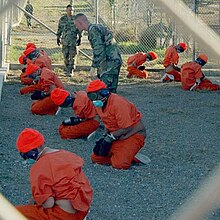 Congress has used its spending oversight authority both to forbid the White House from financing trials of Guantánamo captives on U.S. soil and to block the acquisition of a state prison in Illinois to hold captives currently held in Cuba who would not be put on trial — a sort of Guantánamo North.
Congress has used its spending oversight authority both to forbid the White House from financing trials of Guantánamo captives on U.S. soil and to block the acquisition of a state prison in Illinois to hold captives currently held in Cuba who would not be put on trial — a sort of Guantánamo North.
The latest defense bill adopted by Congress moved to mandate military detention for most future al Qaida cases. The White House withdrew a veto threat on the eve of passage, and then Obama signed it into law with a “signing statement” that suggested he could lawfully ignore it.
On paper, at least, the Obama administration would be set to release almost half the current captives at Guantánamo. The 2009 Task Force Review concluded that about 80 of the 171 detainees now held at Guantánamo could be let go if their home country was stable enough to help resettle them or if a foreign country could safely give them a new start.
But Congress has made it nearly impossible to transfer captives anywhere. Legislation passed since Obama took office has created a series of roadblocks that mean that only a federal court order or a national security waiver issued by Secretary of Defense Leon Panetta could trump Congress and permit the release of a detainee to another country.





 Democrats on the House oversight and government reform committee announced on Tuesday the launch of an...
Democrats on the House oversight and government reform committee announced on Tuesday the launch of an... Lawmakers on both sides of the aisle are accusing the Department of Justice (DOJ) of spying...
Lawmakers on both sides of the aisle are accusing the Department of Justice (DOJ) of spying...






























